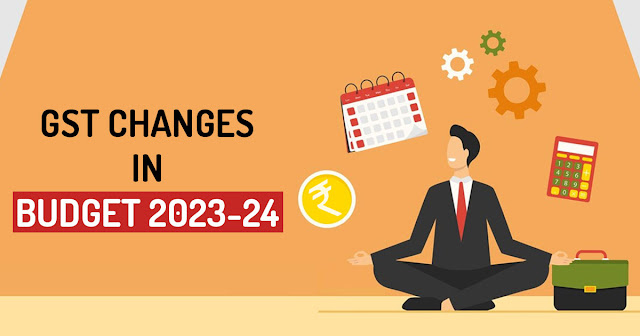A presentation of the Budget 2023-24 has been made by Nirmala Sitharaman, the Finance Minister. The following are 9 legislative GST changes included in budget 2023-24:
Sections 132 and 138 of the CGST Act
According to the CGST Act, sections 132 and 138 will be amended to increase the minimum threshold for launching a tax prosecution from one crore to two crores, except for invoices issued without supplies of goods or services. Compounding the tax amount would be reduced from 50 per cent to 150 per cent to 25 per cent to 100 per cent. There are certain offences specified in clauses (g), (j) and (k) of section 132 of the CGST Act, 2017 that decriminalize obstruction or preventing an officer from fulfilling his duties. These offences include deliberate tampering with evidence; failure to provide information.
Supply of Goods Without GST Registration
A few changes are being made to sections 10 and 122 of the CGST Act to facilitate intra-state supplies of goods by non-registered suppliers and composition taxpayers, subject to certain requirements.
Schedule III Amendment
A new Schedule III of the CGST Act, 2017 was inserted on 01.02.2019 to include clauses 7, 8 (a) and 8 (b) to exclude certain transactions/activities from GST, such as transfers of goods from one location to another within the taxable territory, high sea sales, and the supply of warehoused goods before they are cleared for use at their homes. Provisions are being incorporated for the said paragraphs to become effective from 01.07.2017 to remove doubts and ambiguities regarding the taxability of such transactions/activities during that period. It is, however, not possible to claim a refund of taxes paid with respect to such transactions/activities if any taxes have already been paid during the period from 01.07.2017 to 31.01.2019.
GST Returns
As a result of the amendments to sections 37, 39, 44, and 52 of the CGST Act, 2017 filing of returns and statements will be restricted to a period of three years starting from the due date for filing.
ITC for CSR Expenditure
According to section 17(5) of the CGST Act, a taxable person shall not be eligible for an input tax credit in relation to goods or services received by a taxable person that is used or intended to be used to fulfil his obligations under CSR, as described in section 135 of the Companies Act, 2013.
Introduction of New Section 158A
As a result of the introduction of section 158A of the CGST Act, registered persons will be able to share information they provide in their returns, applications for registration or statements of outward supplies with other systems in a manner to be prescribed, as well as the details they upload on the common portal to generate e-invoices or GST E-way bills or any other details.
Section 2 Clause (16) Amendments
In section 2 of the IGST Act, clause (16) is amended to change the definition of “non-taxable online recipient” by eliminating the requirement that an online information or database access or retrieval service must be used for other than industry, commerce, or any other profession or business in order to make OIDAR services taxable in the non-taxable territory when they are provided to an unregistered individual residing in the taxable territory who receives the services. Additionally, it clarifies that anyone who registers solely under clause (vi) of GST Section 24 of the Act is considered to be an unregistered person.
Access to Online Databases
The definition of "online information and database access or retrieval services" in section 2 of the IGST Act is being revised to remove the condition that the supply is primarily automated requiring little human intervention.
Amendments Related to Place of Supply
In cases where the supplier and recipient of services are located in India, the provision in subsection (8) of section 12 of the IGST Act will be omitted in order to specify the place of supply, regardless of the destination of the goods. Check out LiveLaw's exclusive tax section for more information on tax cases. There are nine legislative GST changes in Budget 2023-24, according to Finance Minister Nirmala Sitharaman. Sections 132 and 138 of the CGST Act decriminalize certain activities.


Comments
Post a Comment